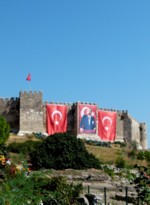Kekova
Our next overnight stop along the coast was to be at Kaş, a drive of 200 kilometres to the west. But some 20 kilometres before arriving we would pass the famed 'sunken city' at Kekova that's billed as one of the region's main tour attractions. Rather than approaching from Kaş like the tour groups do we would call in on the way taking a 'shortcut' along the coast. Yet we found ourselves travelling inland on narrow country lanes through what seemed to be hundreds of acres of empty greenhouses of the kind used for growing tomatoes. But why were they all empty? Are greenhouse tomatoes seasonal? Later, I looked on-line:
Turkey has the fifth largest area of greenhouses in the world, the majority of them in the Antalya region. They have a wide range of uses from growing flowers to fruit (like strawberries) and vegetables (like tomatoes, cucumbers, green peppers and eggplants). But why did they seem to be empty - are these crops seasonal? Maybe they are grown in open fields at this time of year?
Anyway, we were making for the seaside village of Üçağız and this vast agricultural factory-farm area felt like a long way from the sea. There were trucks and tractors and lots of farm structures but no obvious signage pointing to a harbour. Was out TomTom lost? Another block of greenhouses loomed - déjà vu. Finally we turned onto a better road. Then, cresting a ridge, the coastline appeared and in the distance we saw dozens of green and brown islands set in brilliant blue water. It was quite spectacular.
On the way into Kekova
Descending steeply through a scrubby, rocky landscape to the village we were immediately embroiled in traffic, including dozens of tour busses. Just as we were contemplating giving up a helpful man directed us to an empty car parking spot in a side street. He turned out to be a tout for a small boat operator who would take us to the 'sunken city' for an outrageous fee. Did we want to see a sunken city that badly? We negotiated a marginally better price and eventually decided to do it.
It was a good decision. It was a wonderful afternoon. The weather was perfect for a boat ride and the tour of the ancient remnants turned out to be interesting, even though the 'sunken city' is way oversold. 'Sunken couple of walls' might be a better description. Yet the combined experience turned out to be one of the highlights of the entire trip.
The town that can only be reached by water; many abandoned sarcophagi; and an underwater wall
It was time to drive to Kaş in time to check-in to our hotel and get ready for the evening.

